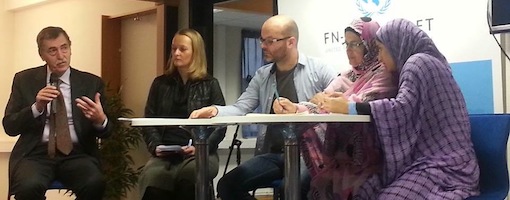Sahrawi human rights activist and former UN top official to Norway

Sahrawi human rights activist Elghalia Djimi and former Special Representative of the Secretary-General for Western Sahara Francesco Bastagli were among the guests at oil seminars in Oslo and Stavanger last week.
Published 21 November 2013
(Image: From left to right: Former Special Representative of the Secretary-General for Western Sahara Francesco Bastagli, Head of responsible investment of the life insurances company KLP Jeanett Bergan, Chair of Western Sahara Resource Watch Erik Hagen, Vice President of Sahrawi human rights organization ASVDH Elghalia Djimi, interpreter Senia Abderrahman)
The UN Legal Office has established that further oil search in Western Sahara would be in violation of international law. Yet, the industry escalates, led by French company Total. Who participates? What are the consequences? And what is done to stop the violation of international law? Those were the questions addressed at the two seminars that were held in Oslo and Stavanger last week.
Former Special Representative of the Secretary-General for Western Sahara Francesco Bastagli opened the seminar by sharing his views about the UN's role in the Western Sahara conflict.
"There is always something more important, more urgent than the Western Sahara issue. There shouldn't be categories of urgency concerning human rights abuses, but sadly that is what has happened here. There have been many failures at different levels of the UN", said Bastagli.
He underlined that the principle of not exploiting the natural resources of an occupied territory dates back thousands of years, even back to the Romans. "The UN legal opinion also states that exploiting oil without the consent of the Sahrawi people is illegal. Still it is being done", he said.
Chair of Western Sahara Resource Watch Erik Hagen went on to give a historical background of oil exploration in Western Sahara.
"Since the legal opinion came in 2002, the Norwegian government has urged Norwegian companies not to get involved in Western Sahara. Still, Norwegian companies came in right after the legal opinion was issued, in the summer of 2002, and have been involved in seismic studies among other things", Hagen said.
He underlined how the Norwegian government introduced a set of ethical guidelines for the management of its sovereign wealth fund in 2004. "Shortly after, the US energy company Kerr McGee was the first company to be excluded from its portfolio because of its involvement in Western Sahara. They consequently pulled out. Seven other companies have also pulled out because of our campaigns", said Hagen.
"The oil company Kosmos is now where Kerr McGee was before.", he said.
"The possibilities of finding gas in the Zag block would make it possible for Morocco to process phosphate, and thereby earn even more money from the occupation. For this reason, it is particularly important to stop companies from getting involved here", said Hagen.
He also mentioned the prospect of American and British companies starting drilling for oil already in 2014, and said this is an alarming development, as long as the Sahrawis' concerns are not taken into consideration.
The Vice President of the Sahrawi human rights organization ASVDH (The association for Sahrawi victims of grave human rights abuses committed by the Moroccan state) Elghalia Djimi thanked the Norwegian government for bringing up the issue of freedom of organization for the Sahrawis in the UN Human rights council in Geneva.
Djimi was herself disappeared between 1987 and 1991 and her mother has been missing since 1984.
"The recently found mass graves in Western Sahara exposes the Moroccan lies about the disappearances: In 1991, 324 formerly disappeared people were released, among them 78 women. Morocco previously denied the existence of these disappearances", said Djimi.
Her organization, ASVDH, was formed in 2005 and works to get information about forced disappearances and other human rights violations. "We followed all formal rules for registration of our organization, but it has not been recognized", said Djimi.
"In 2005, there were many open demonstrations, and since then hundreds of activists are in prison. The Moroccan government keeps them away in order to break their contact with the civil society. This makes it difficult to educate youth about the importance of non-violent resistance", she said.
She expressed her continuous hope for the future, saying she still participates in demonstrations, and she also expressed her confidence in Christopher Ross, the current UN special envoy to the Western Sahara.
Finally, head of responsible investment of the life insurances company KLP Jeanett Bergan explained the reasons for KLP excluding Total from the company's investment portfolios earlier this year.
"In our dialogue with Total, the company emphasized the nature of their activities in Western Sahara, that they are doing seismic studies and not drilling, and therefore their activities are not in contradiction of the legal opinion. We found this argument not to be valid", she said.
"KLP has had a dialogue with Total for a long time before the exclusion. The investment in Total is important for us financially and we would like to have the company in our portfolio, but we found the breach of international law to be more important", Bergan stated.
News
NY Check new Western Sahara poster!
“Try to Visit Western Sahara”…
10 July 2020
The Security Council fails Western Sahara and international law
On 31 October 2025, a new resolution was adopted in the UN Security Council calling on the Saharawis to negotiate a solution that would entail their incorporation into the occupying power, Morocco.
03 November 2025
Saharawis Demonstrate Against Trump Proposal
The United States has proposed in a meeting of the UN Security Council on Thursday that the occupied Western Sahara be incorporated into Morocco.
28 October 2025
Skretting Turkey misled about sustainability
Dutch-Norwegian fish feed giant admits using conflict fishmeal from occupied Western Sahara. Last month, it removed a fake sustainability claim from its website.
27 October 2025



